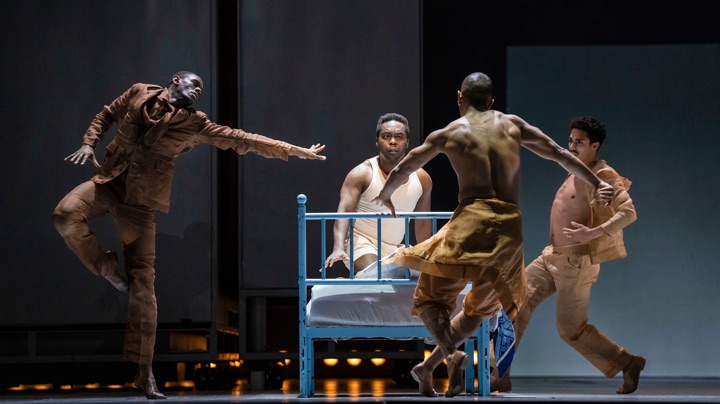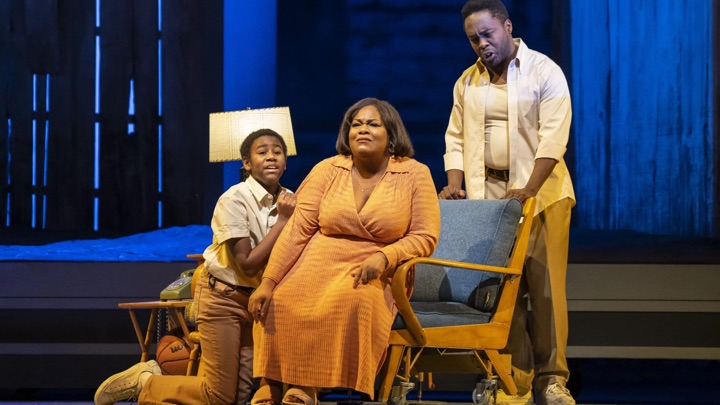
Terence Blanchard’s music is a combination of styles utilizing classical, jazz, and gospel tones, always beautiful though sometimes noisy to reflect the story’s changing moods. It is helped by the wonderful libretto by Kasi Lemmons, always natural to speech while managing to be absolutely poetic. Some of her phrases have stayed in my head for days.
The opera also features the work of 12 superb dancers, and some of the most inventive choreography I have ever seen in a theatre. The original choreography is by co-director Camille A. Brown, revival choreography by Jay Staten. The dance sequences in Act Two and the astonishing “Stepping” scene at the college in Act Three will literally take your breath away.
The story follows the story of Mr. Blow, embodied here by the character of Charles, who we meet at age seven as “a boy of peculiar grace,” who feels lonely and distanced from his brothers and other children. The adult Charles looking back on his life often speaks in unison with “Char’es-Baby” as he is called by peers and neighbors in his small Louisiana town. Charles lives in poverty with his overprotective mother Billie, who longs for a better life and hates her job in a chicken factory.
The crucial moment in Act One is when a visiting older cousin sexually abuses him, and he is horrified and shamed into silence. The guilt, shame, and fear this incident causes in Charles turns into a long journey into adulthood trying to mold a life despite the confusion and rage caused by his secret past.
We see Charles in Act 2 as a teenager in a church being baptized, hoping that God will cleanse him. When this doesn’t work, he tries talking with his brothers, who dismiss him as “soft talk.” Loneliness and despair, here personified by singer Brittany Renee (excellent), promise to be with him always.
Charles gets a scholarship to Grambling University, where he joins a fraternity and at a party meets Greta (also Ms. Renee) and they begin a love affair. When Charles tells her of his seven-year-old self’s abuse and how he needs her, Greta abandons him for another man. Crushed, Charles calls home and learns to his horror that his cousin who molested him is visiting at his mother’s again. Charles grabs a gun and decides to drive home to confront his cousin Chester. The opera’s powerful ending is deeply moving and somehow redemptive.
Fifth grader Benjamin Preacely plays the seven-year old Char’es-Baby to the hilt, singing with great beauty. He gives way to baritone Will LIverman as the adult Charles in a sizzling, emotional performance. LIverman embodies all of Charles’ passions perfectly from joy to panic to despair, all the while singing with beauty and emotional power. It is the marriage of a beautifully written role with a remarkable singing actor.
Latonia Moore anchors the opera as Charles’ long suffering mother Billie, who also has a long and emotional journey in her own life. The soprano sings with grace and power, hurling out stunning high notes with ease, with a wonderful variety of vocal colors and nuanced phrasing. Whether in fury about her husband’s infidelities or reflecting quietly on her life and hope to “one day be a secretary,” Ms. Moore displays dramatic commitment and is always believable.
Others doing fine work in the cast include Chauncey Parker as Billie’s charming but philandering husband Spinner, Reginald Smith Jr., who uses his robust baritone as kindly Uncle Paul, and Chris Kenney as Cousin Chester, so believable that he got good-natured boos at the curtain call. There was a great sense of cohesion among the entire ensemble.
Co-directors James Robinson and Camille A. Brown did a superb job of telling the story, expertly paced and luring passionate and emotional performances from the cast. The excellent set by Allen Moyer, mostly made up of moving blocks changing their shape to suit the many locations and backed by haunting projections by Greg Emetaz. Paul Tazewell’s costumes were colorful and effective, and lighting by Christopher Akerlind beautifully reflected the opera’s moody climate.
Conductor Daniela Candillari, so effective leading Fellow Travelers a few years ago, really knows her way around today’s music. Her conducting seamlessly interweaves the varying musical styles of Blanchard’s complex score, and the Lyric Opera Orchestra responded with spirited and delicate playing.
I think Fire Shut Up In My Bones will be an opera “with legs.” It combines music, dancing, and acting almost like a heightened piece of musical theatre with a real emotional punch. It should appeal to opera lovers and newcomers as well. I cannot recommend it too highly.




